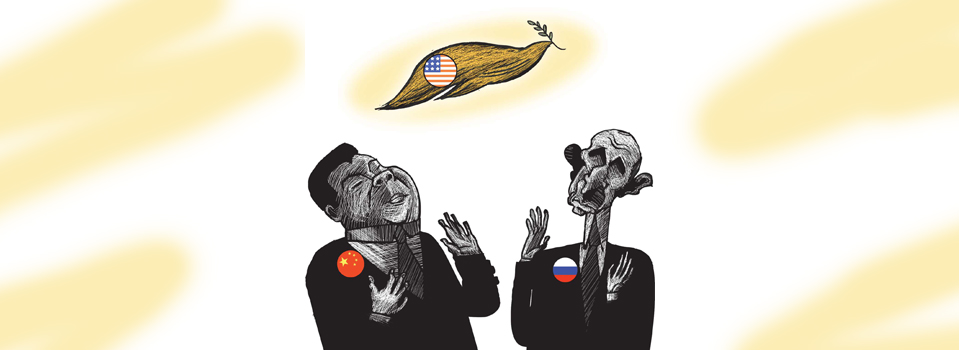TRUMP INAUGURATES THE END OF THE END OF THE COLD WAR

While United States President Donald Trump fixates both supporters and opponents with his controversial policy moves, what should capture the world’s attention is its strategic future.
Shaping up already under his leadership, that future involves a new relationship among the US, Russia and China. It predicts the end of the end of the Cold War.
It is clear that Mr Trump sees China as an economic rival and a strategic adversary. It is equally clear that he wants to refashion relations with Russia to make it a kindred power.
What does not follow, however, is that Washington will be able to count on Moscow to counter Beijing. Instead, it is Russia that could emerge as the new international kingpin and the balancer or fulcrum power between the US and China.
Were Russia to gain that prominence, its success would constitute an ironic reversal of one of the highest points of American diplomacy in the last century.
That occurred in the 1970s, when the US recast the hostile parameters between communism and democracy by reaching out to China.
The Sino-American rapprochement of 1972, achieved between US President Richard Nixon and Chinese leader Mao Zedong, bore the inimitable stamp of Dr Henry Kissinger, realpolitik’s gift to a fickle world. That scholar-statesman’s ability to draw China towards the US in spite of serious ideological differences between the two countries changed the course of 20th-century history.
The US redrew the contours of the Cold War by enjoying better relations with both China and the Soviet Union than they had with each other.
This was the crucial change.
The Sino-Soviet split of the 1960s had led up to that breakthrough. However, it was Dr Kissinger’s genius that transformed opportunity into reality.
Under him and President Nixon, America became the global swing power.
Its detente with the Soviet Union protected Europe, one flank of its international reach, while its rapprochement with China protected another: Asia.
If the communists in Moscow proved difficult, Washington could turn to the communists in Beijing – and the other way around.
So bad were relations between the two apparently fraternal communist nations that Moscow and Beijing would rather play along with the wily democrats in Washington than cut deals with each other.
The Nixon-Kissinger years crafted a world order that lasted till the end of the Cold War in 1989.
NEW WORLD IN THE MAKING
Today, President Trump seeks to recreate a similar world order, one with America at its untouchable apex. It is doubtful that he will succeed.
Instead, it could be Russia that wins because it enjoys better relations with America and China than the two nations do with each other.
There are other reasons for America not emerging as the victor in a new triangular game.
First, China reciprocated the American turn towards it in the 1970s because it was economically weaker than the US and militarily inferior to both it and the Soviet Union.
That strategic disparity prevails even today among the three nuclear-armed nations but the economic hierarchy has vanished.
China is a thrusting economic power, unlike Russia. The US is still the world’s richest nation but it could foreclose its global economic hinterland by turning inwards and protectionist. That is a real possibility under Mr Trump.
Second, Russia is a nuclear peer of the US and is far more powerful than nuclear China.
However, nuclear missiles cannot be used as the currency of power in financial markets.
Russia understands, although it is not saying it, that any strategic concessions which the US makes to it in Europe will not translate into material benefits in a de-globalised American market.
Third, the world does not consist only of America, Russia and China.
Other players, such as the European Union, Japan, India and Australia, are watching developments and trends warily.
They will not throw their weight collectively behind the Americans if they believe that Russia will be the ultimate victor of the triangular politics.
LOOKING FURTHER AFIELD TO EUROPE, ASIA
This recognition does not mean necessarily that other countries will side with Russia. It means that they will not side automatically with the US against China.
The EU has little reason to hate China and much reason to fear Russia, whose annexation of the Ukrainian territory of Crimea has revealed the revanchism which it is capable of, in spite of the Soviet empire’s disappearance.
Japan and Australia are bound to the US by treaty relationships but they are not obliged thereby to support every American action.
In fact, if Mr Trump’s policies carry out his campaign-trail assertion that he does not mind allied countries such as Japan going nuclear if they do not pay America for their strategic upkeep, Tokyo well might decide to go its own way.
Its military policies still would be directed at keeping China at bay – but at bay from Japan, not the US.
Australia would then have to decide whether to hold on to what essentially is an ethnic special relationship with Anglo-Saxon America, or cut a deal with the Chinese.
The Chinese love deals.
In the circumstances, even India’s distrust of Chinese intentions and ambitions, inherited from their border conflict of 1962, would have to be measured against the realities of contemporary nuclear coexistence.
India and China are neighbours. Unlike friends from across the Pacific, whose aircraft carriers can sail away as quickly as they arrived, neighbours on land never go away.
In any case, Indian foreign policy is independent enough of other great-power relationships to survive US diplomatic adventurism.
It is Russia that will win through inaction in all these scenarios, except in its relations with the EU.
However, an ascendant Russia could be wise enough to treat Europe with benign neglect, particularly if Mr Trump follows through on his remarkable discovery that the North Atlantic Treaty Organisation (Nato) is obsolete.
If Nato withers away, Russia will have no reason to be hostile to European countries to whom America’s providential guardianship of Nato has become an article of transatlantic faith.
Asean, a price-taker in international relations, will have to find its place in the interstices of the new global architecture.
But that should not be a problem. Asean survived the end of the Cold War. There is little reason why it cannot survive the end of the end of the Cold War.

